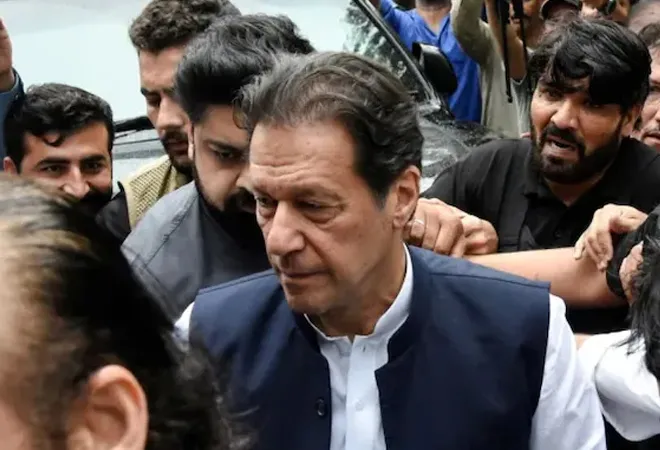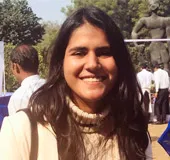-
CENTRES
Progammes & Centres
Location
The growing resignations of his party members and a defendant tone in Imran Khan’s rhetoric signify that the PTI is now struggling to chart its next steps

This brief is part of the series, Pakistan: The Unravelling
In the aftermath of the events of 9 May and the quest to fix culpability for the arson and deliberate targeting of military structures and installations, the Pakistan Tehreek-e-Insaf (PTI) party is under immense pressure. Many senior leaders of the party, like former Sindh Governor Imran Ismail, Shireen Mazari, etc., were apprehended with some going underground to evade arrest. In addition to this, till the time of writing, 19 PTI members had resigned with the possibility of more leaders following suit. The crackdown on PTI workers and their leaders alike has compounded the difficulties for Imran Khan and raised doubts about a potential power struggle brewing within the party.
Nation before politics?
Lamenting over the violence of the events of 9 May, former ministers such as Dr Hisham Inamullah, Aamir Kiyani, and Malik Amin Aslam along with Members of the National Assembly (MNA) of Pakistan such as Karim Bax Gabol, Sanjay Gangwani, etc., have resigned from the party. Defending their decision to quit, they invariably highlighted how the attack on the military was a red line for them as it goes against the country’s national interests, compelling them to dissociate themselves from the party. Some highlighted their disappointment at the PTI chairman’s inability to criticise the attacks. According to them, the party has now diverted from its main struggle and is moving in the wrong direction under the influence of certain members. To deflect concerns about the military forcing them to resign, all of them made it a point to highlight that their decision was bereft of any external pressure.
The crackdown on PTI workers and their leaders alike has compounded the difficulties for Imran Khan and raised doubts about a potential power struggle brewing within the party.
In response to growing calls asking him to criticise the attacks, Khan iterated how it is a ‘fool’s errand’ to go against one’s army as no good can come out of it. The sole beneficiary of this chaos, as per him, is the ruling coalition whose fundamental interest is to widen the differences between the PTI and the military. He urged the Supreme Court to form an independent commission to unearth the conspiracy and committed to turn over any of his workers if they’re seen involved in any violent attacks. Many leaders from South Punjab also criticised the violent turn of events. Defending his belated criticism, he blamed the Pakistan Democratic Movement government for suspending the internet services that led to the circulation of ‘organised propaganda’ aimed at putting into question his party’s commitment to the country.
As per Dawn, of those jumping ships, as shared by the PTI leaders themselves, most members are apparent weaklings. Their failure to secure party tickets and their already precarious relationship with the leadership made them easy pressure targets. The local leadership is cognizant of the fact that the establishment might employ more coercive methods to force them to turncoat. They also state that while the police have been quick in apprehending many PTI leaders and their families, they have been rather reticent to detain leaders like Kiyani, who ultimately resigned, hinting at him being given preferential treatment. Certain members from Sindh also complained that they were being forced by the provincial government to resign. While most leaders have asserted that they were blindsided by how quickly things turned violent, the possibility of the party being aware of the plans to attack the military structures and now using the backlash to find an easy, if inconvenient, exit cannot be ruled out.
Defending his belated criticism, he blamed the Pakistan Democratic Movement government for suspending the internet services that led to the circulation of ‘organised propaganda’ aimed at putting into question his party’s commitment to the country.
Khan’s public response to the resignations has been rather muted. Expressing sympathy for his party members who had to resign and appreciating the resolve of those who didn’t, he advised the people to not criticise them. In his typical paternalistic tone, he underscored the immense pressure these people might have felt and the deeply entrenched hold of the military that succeeded in coaxing even his closest party members to leave. While he has shown reluctance at the prospect of accepting the leaders back into the party’s fold, he has expressed confidence in his party’s ability to tide this storm. As per Khan, the protestors were misled by certain ‘miscreants’ who joined them on that fateful day. These ‘agency men’ were placed by the ruling coalition and the military with the intention to ‘disintegrate’ the PTI and stifle their struggle.
Return to the National Assembly
In another interesting development, the Lahore High Court suspended the resignations of 72 PTI MNAs and asked them to appear in front of the Speaker in person to have their resignations withdrawn. This was in reference to the petition signed by some PTI members who requested the court to rescind their resignations and undo their denotification from the National Assembly. While the orders were suspended by the Sindh and Lahore High courts in February, it still did not enable them to enter the Parliament. Since their resignations, the opposition has been practically missing from the National Assembly. The resignations were done to force the government to hold the general elections, but for the PTI, the trade-off of dwindling control on the appointment to key positions and the privileges that come with the presence of an opposition leader had become starker.
The ruling coalition has also used the desertions from the PTI to highlight the dismantlement of ‘Project Imran’ and the victory of ‘Pakistan’s ideology’ over the selfish, vested interests of a political leader.
Welcoming the judgement, Khan expressed happiness at his members’ ability to voice their concerns in the Parliament now. PTI’s lawyer also highlighted how the presence of a credible opposition in the Parliament will resolve the ‘political crisis’. But Khan ruled out his participation in the house, pointing at its ‘political and legislative’ irrelevance. These dismissals of engaging with the ruling coalition in a democratic setup call into question his commitment to stymie the military’s control over politics and render any hopes of the political crisis cooling down as wishful thinking. A basic tenet of ensuring that democracy is well and functioning is the presence of effective dialogue between the party in power and the opposition, no matter how inconvenient.
As the military prepares to try the detained protestors under the military laws, hopes of the events of the past week facilitating a tectonic shift in how Pakistan functions are in tatters. The growing resignations of his party members and a defendant tone in Khan’s rhetoric signify that the PTI is now struggling to chart its next steps. The ruling coalition has also used the desertions from the PTI to highlight the dismantlement of ‘Project Imran’ and the victory of ‘Pakistan’s ideology’ over the selfish, vested interests of a political leader. In this brick batting, the economy and other areas that require the government and all other stakeholders’ utmost attention are struggling. With all energies invested in one upping each other in this political slugfest to defend the Pakistani ‘nation’ and its ‘ideology’, the real loser will be the Pakistani citizen.
Shivam Shekhawat is a Research Assistant with ORF’s Strategic Studies Programme.
The views expressed above belong to the author(s). ORF research and analyses now available on Telegram! Click here to access our curated content — blogs, longforms and interviews.

Shivam Shekhawat is a Junior Fellow with ORF’s Strategic Studies Programme. Her research focuses primarily on India’s neighbourhood- particularly tracking the security, political and economic ...
Read More +